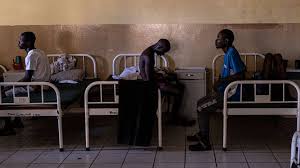By Hassan Osman Kargbo
The kush drug epidemic continues to tighten its grip on Sierra Leone, spreading across communities and leaving devastation in its wake. Despite ongoing government efforts to contain the crisis, the situation is worsening, with many rehabilitation centers forced to shut down due to a lack of funds. This has sparked growing public frustration and renewed calls for stronger, more coordinated action to tackle the problem.
Across the country, the effects of the kush scourge are visible in every community. Young people, some barely out of school, are falling victim to the addictive substance. Families are breaking apart, and entire neighborhoods are reeling from the daily sight of youths rendered helpless by addiction.
The government, under the Drug and Substance Abuse Public Emergency declared by President Julius Maada Bio in April 2024, has taken steps to address the situation through awareness campaigns, arrests of traffickers, and stricter enforcement. However, the lack of functioning rehabilitation facilities remains one of the greatest obstacles to any lasting solution.
In Freetown, Kenema, and Makeni, several treatment centers that once offered hope to families have reportedly closed their doors due to financial constraints. This has left hundreds of addicts stranded with nowhere to seek help, forcing many families to care for their loved ones at home under unsafe conditions.
A lot of people have expressed deep dissatisfaction with the government’s approach. “How can we win this fight when there is no place to take our children for proper treatment?” asked Fatmata Kamara, a single mother at Wellington whose son has been battling addiction for almost two years. “They arrest the users, but where do they send them after? The streets are not treatment centers.”
Health workers and community activists share the same frustration. Dr. Ibrahim Conteh, a mental health specialist, explained that without rehabilitation centers, enforcement efforts will remain incomplete. “Rehabilitation is the backbone of recovery,” he said. “We cannot simply arrest our way out of a drug crisis. Addicts need medical attention, counseling, and reintegration support.”
The situation has also raised concern among religious and youth groups. Reverend Samuel Kargbo of Freetown described the crisis as “a national tragedy demanding both compassion and commitment.” He called on the government and development partners to prioritize funding for community-based rehabilitation programs.
Meanwhile, some activists argue that more collaboration with civil society and local councils could help ensure that anti-drug strategies reach the most affected communities. “We need a people-centered approach,” said Mariama Sesay, a youth advocate. “Without rehabilitation centers, awareness campaigns alone are meaningless. The government must invest in treatment, not just enforcement.”
As the crisis intensifies, citizens are urging authorities to act with greater urgency and empathy. The kush epidemic, many say, is no longer just a social issue, it is a national emergency threatening Sierra Leone’s future. Without accessible rehabilitation facilities, they warn, the nation risks losing an entire generation to addiction.











